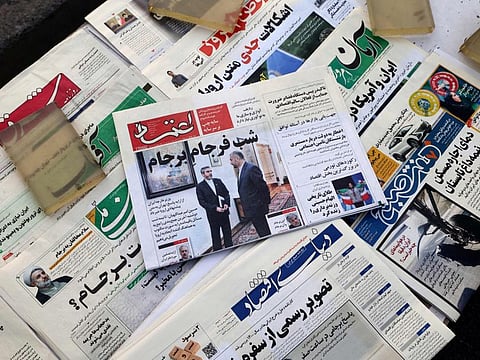US weighs plan to revive Iran nuclear deal that Trump abandoned
Officials signal possibility deal could emerge now after more than year of false starts

Washington: The Biden administration is weighing Iran’s response to a European Union proposal aimed at reviving the 2015 international nuclear agreement, with officials on both sides of the Atlantic signalling the possibility that a deal could emerge now after more than a year of false starts.
While the US so far has refused to comment in detail on the proposal, floated by EU foreign policy chief Josep Borrell as a last-ditch effort to save the Joint Comprehensive Plan of Action, State Department spokesman Ned Price said on Tuesday the big issues have been “largely settled” and that it was close to what the US was looking for.
“This is the text that the EU has put on the table that is substantially based on the deal that has been on the table for several months now,” Price said.
Administration officials say there are no plans to remove the designation of Iran’s Islamic Revolutionary Guard Corps as a foreign terrorist organisation - heading off a political firestorm prompted by reports that the move was under consideration in Washington.
The US openness to the EU proposal, coupled with an Iranian response received on Monday night that one European described as constructive, raised fresh hopes that Iran, the US and other signatories to the nuclear deal are close to reaching an agreement after months of tortured negotiations.
Iran’s top foreign policy, nuclear and security officials met with lawmakers in Tehran on Wednesday to brief them on their submission to the EU. Speaking after the special session a senior legislator said the document included amendments to clauses covering sanctions, Iran’s demand for guarantees that the US won’t again leave the pact, and nuclear safeguards.
“Whenever our interests are met, Iran will be ready to sign a good agreement,” said Vahid Jalalzadeh, head of parliament’s National Security Commission. Another lawmaker present, Abbas Moghtadaei, said an agreement process was “underway and negotiations have ended.”
Behind the scenes
With all sides refusing to give details, others preached caution. It’s still unclear why the prospects for agreement would have improved given that the terms of the EU proposal don’t differ dramatically from a February draft, said Michael Singh, a former senior director for Middle East affairs at the National Security Council.
“It’s hard to see anything that’s fundamentally changed unless things are happening behind the scenes that we just can’t perceive,” he said.
Former President Donald Trump withdrew from the nuclear deal in 2018, and President Joe Biden had made restoring it a top foreign-policy priority. But the negotiations dragged on for months, bedeviled by Iran’s continued nuclear advances, the arrival of a more hardline government in the summer of 2021 and disagreements over what to do about the many non-nuclear sanctions that the Trump administration imposed during its waning days in office.
Biden has come under intense political pressure from Republicans not to make any concessions given what they describe as its more aggressive behaviour more broadly. In recent days, prosecutors charged an Iranian national with planning to kill former presidential aide John Bolton, while US officials have condemned Iranian hardliners for celebrating last Friday’s violent knife attack on writer Salman Rushdie.
EU mediators had circulated a “final” proposal for salvaging the deal last week. Iran formally submitted its response to the EU on Monday night, and an official familiar with the diplomatic efforts, who asked not to be identified given the sensitivity of the talks, said the Iranian response was constructive.
The official said Iran’s response still required study and that other parties to the nuclear talks - which include the US, China and Russia - are assessing it.
On Tuesday, an adviser to Iran’s nuclear negotiating team said Tehran had raised the issue of guarantees. He suggested a mechanism whereby a US exit from the pact triggers an immediate re-expansion of Iran’s uranium-enrichment programme.
Biden’s refusal to offer a guarantee has long been a stumbling block in the talks. The US argued that it can’t make any such promise given that Republicans will almost certainly try to scuttle the deal if they gain control of Congress later this year or the White House in 2024.
Randa Slim, director of the Conflict Resolution and Track II Dialogues Program at the Middle East Institute in Washington, said the sides are “incentivized for their own reasons to basically bring this to some kind of success.”
“Whether they can do it, because of domestic political constraints, that’s a different issue,” she said.
Sign up for the Daily Briefing
Get the latest news and updates straight to your inbox



